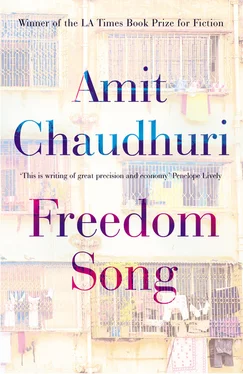And Mini’s departure created a gap, a hiatus, that would take time to be replenished again. She had left a vacancy in Khuku’s flat, a vague but living memory of her sitting upon a sofa, reading, and it would take time now for Khuku’s life to reassert itself. Later, Khuku would hear of Mini’s being restricted to her home because of Shantidi’s accident, a fall down the stairs and a minor but troublesome fracture. Winter would end, and Mini would be circumscribed by teaching during the day and returning home. It was as if life, or history, were a spirit that kept transforming its features, discontented to be one thing at one time.
The change in the weather from late January to early February was small but palpable, a fractional abatement of the dawn’s and evening’s chill. The winter, crystalline at dawn, smoke-filled in memory, was ending. Then there were the other changes, the larger ones; as the country altered, gradually and almost imperceptibly, from one kind of place to another. Memories died and new ways of life came into being.
Then, in February, Bhaskar’s parents began to look for a bride for him in earnest, surreptitiously almost, neither advertising in newspapers nor telling relatives, but sending out signals discreetly.
Although he knew now that they wouldn’t make his plan for Little’s work, Shib kept going as if nothing had happened. Once he was in his office, accountants came into his room to ask him to clear up some problem they were having or simply for some advice, and he would help them out — almost minister to them wondering what his role here was supposed to be. But no real work had been done for days.
His youthfulness (though they knew he was a retired man) had moved the rest of the staff from apathy to something approaching constructiveness. He had come in like a spirit in transit. And he still walked more quickly than most men forty years younger than him.
Again the feeling of peace returned. He could pick up his telephone and ring Khuku if he wanted, but he didn’t feel the need to.
He sorted out his files gravely. He was used to being alone, inhabiting his own world: for he was an only child whose mother had died when he was two. Moreover, he had completed a lifetime of looking after others and fending for himself; even Khuku, when he’d first married her, was in many ways helpless; and he had been a sort of shade-giving umbrella to his son, who’d had a happy and extended childhood.
When he’d first come to Calcutta he’d been a young man, twenty years old, and he’d put his name down, Shib Purakayastha, in a register in Calcutta University.
He smiled. Is there an alchemy for making the old new?
‘Tea, sir?’
He smiled and shook his head at the man who had asked the question.
The man withdrew.
Two months ago it was that he’d considered with an employee, a marketing manager in this company whose products seldom infiltrated the market, the idea of putting in a fresh advertisement for the company. ‘But where?’ There was, for instance, a seven-year-old poster with Little’s printed upon it in large letters under a railway bridge in the South — day and night the trains rumbled above it and the bridge shuddered — whose paper had peeled off almost entirely, leaving behind, miraculously, only the ‘Little’s’ at the top.
Sometimes this man, who had just asked him if he would have tea, brought him lozenges in their new wrappers with Little’s printed on both sides. He had ceased to wonder about this company, or what he really did here, or where his salary came from. And Shib had asked to see the lozenges because he was interested in assessing the ‘standard’ of the product; he’d taken them home to his wife, surprising her by giving her a small full packet. For the story of a working life is also the story of a marriage. She’d put one to the test immediately.
‘But it’s wonderful!’ Khuku had said, absorbed in the flavour of the lozenge; it reminded her of when she was a child, for the flavour, as it was then, came back to her unchanged; she’d tasted them in Shillong as a girl; and she grew puzzled and anxious trying to understand the reasons for Little’s decline.
Each time a state- or government-supported company closed down, it was like a death-knell that no one heard. And Shib heard it these days.
It was only after months that people realized that a company was gone. A product disappeared from the market, or it might be bought over by a Marwari businessman and sold as if nothing had happened. And as if removed from all this, in a constricted space, the office window looked out onto the stunted outgrowth of Dum Dum.
But in his spare time, Khuku’s husband had decided to put aside some money in shares; he had a premonition that there was a change at hand. All his life, he had worked in a company, and had had no taste for business or speculation; he had been a cautious and qualified professional. But now, four years after retirement, some demon seemed to have seized him; when he was not watching television, he wore small, focused reading glasses that sat low on the bridge of his nose, and fussed over papers and forms. Now, with economic deregulation and a freedom that, in theory, had never existed before, there was the prospect of a rainbow-deluge of collaborations and all kind of opportunities coming to the surface. And Little’s would then be a thing of yesterday.
Cautiously he decided to invest some money in the Mutual Fund and uncharacteristically to buy a few shares in a company that made biscuits, and in another one that made shoes. Now, in the last quarter of his life, a business acumen and speculative curiosity, long suppressed in the interests of his managerial skills, began to come into play, and also a silent, watchful interest in political issues, and he began to peruse the papers with more than usual thoroughness. His gaze and concentration as he absorbed the curve and emerging shape of the time were intent.
All was silence around him. At odd moments lost in thoughts on these matters he could be found humming to himself. No one but Khuku, and Bablu, who was not here, knew that he sang. From what little could be heard of that singing voice it would seem that it was a small, high-pitched one, at variance with the quiet dignity of his persona, not very sure of itself. It skirted around the difficult portions and paraphrased the tune rather than sang it; but it was a strange, lonely rehearsal to itself (often in response to a song that Khuku had just sung) rather than meant for others to hear. When Khuku overheard him, she would say to her husband—‘What? what? are you singing? I see you’re not lacking in courage!’—and, discouraged, he would stop.
Women’s memories of their husbands’ working life are radically but subtly different from their husbands’ own, and the same must be true of their retirement. It’s like seeing something from the other side. Of course, Khuku felt lonely when Shib was in his office; and always had done. But, then, during the curfew, when shops and offices and everything else had been closed — ten days of nothing happening — she’d had her wish come true, and Shib at home with her for twenty-four hours of the day.
It had been a mixed blessing, this enforced, artificial reunion. It was as if a train they’d been on had halted somewhere unexpectedly and they’d been forced to take a holiday. She’d found that he wasn’t interested in discussing what was happening at all — the riots, the anger; more interested in re-reading old copies of the Statesman which he’d accumulated during the last week in a drawer. How little concerned he was about the silence outside, in which the sound of a single car horn became disconcerting, as he sat all morning reading! Neglecting to shave, even; a grey stubble appearing on his cheeks.
Читать дальше












